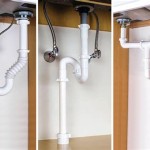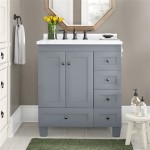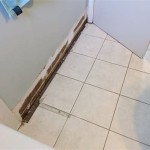Why Does The Bathroom Sink Smell Like Rotten Eggs?
The presence of a rotten egg smell emanating from a bathroom sink is a common, albeit unpleasant, household issue. This distinct odor is almost always indicative of the presence of hydrogen sulfide (H₂S) gas. Understanding the source of this gas and the conditions that promote its formation is crucial for effectively addressing and resolving the problem. Ignoring the issue can lead to the continued presence of the offensive smell and, in certain circumstances, might even point to more significant plumbing or drainage problems.
The source of the rotten egg smell is rarely the sink itself. Instead, the odor typically originates from issues within the drain pipes, the water supply, or the sewer system linked to the bathroom sink. Pinpointing the exact cause requires careful consideration of several contributing factors, including the frequency and intensity of the smell, recent plumbing work, and the overall condition of the home's plumbing infrastructure.
The Role of Bacteria in Hydrogen Sulfide Production
The most frequent cause of a rotten egg smell from a bathroom sink is the activity of sulfate-reducing bacteria (SRB). These microorganisms thrive in oxygen-deficient environments and obtain energy by reducing sulfate ions (SO₄²⁻) to sulfide ions (S²⁻). This process releases hydrogen sulfide gas as a byproduct, which is then detectable as the offensive rotten egg smell. Bathrooms offer several ideal environments for SRB to flourish.
One such environment is the drainpipe system itself. Food particles, hair, soap scum, and other organic matter that accumulates in the drain provide a constant source of nutrients for these bacteria. The lack of regular flushing, or infrequent sink usage, further exacerbates the issue by allowing standing water to stagnate within the drain, creating an anaerobic (oxygen-free) condition favorable to SRB. This is particularly common in guest bathrooms or powder rooms that see less frequent use than the main bathroom.
Another potential breeding ground for SRB is the P-trap. The P-trap is the curved section of pipe located beneath the sink that is designed to hold a small amount of water. This water acts as a barrier, preventing sewer gases (which include hydrogen sulfide) from entering the home. However, if the P-trap dries out due to infrequent use or evaporation, the sewer gas can escape, resulting in the characteristic rotten egg smell. Additionally, if the P-trap contains a significant buildup of organic debris, this can provide a substrate for SRB to colonize and produce hydrogen sulfide directly within the P-trap.
Furthermore, biofilms, which are complex communities of microorganisms attached to a surface, can form within the drainpipes. These biofilms can harbor SRB and provide a protective environment that shields them from cleaning agents and other environmental stressors. The biofilm matrix also facilitates the concentration of sulfate ions and organic matter, further promoting hydrogen sulfide production.
The temperature of the water and the surrounding environment also plays a role. Warmer temperatures generally favor the growth and activity of SRB, which can explain why the smell might be more noticeable during warmer months or after running hot water. The pH of the water and the presence of other chemicals can also influence the bacterial activity and the rate of hydrogen sulfide production.
Potential Issues Within the Water Supply
While SRB within the drain system is the most common culprit, the rotten egg smell can sometimes originate from the water supply itself. This is especially likely if the entire house, and not just a single sink, exhibits the odor. Sources of water contamination can vary depending on whether the property relies on a municipal water system or a private well.
In municipal water systems, the presence of hydrogen sulfide is usually addressed through treatment processes such as aeration and chlorination. However, in some cases, residual sulfate in the water can still provide a substrate for SRB to proliferate within the household plumbing. This is more likely to occur if the water sits stagnant in the pipes for extended periods or if there are dead legs (sections of pipe that are no longer in use) in the plumbing system.
For properties relying on well water, the presence of hydrogen sulfide is a more frequent concern. Groundwater can naturally contain dissolved sulfate and organic matter, providing the necessary ingredients for SRB to thrive. The well itself can also become contaminated with SRB, leading to a persistent rotten egg smell in the water supply. Factors such as the depth of the well, the geological composition of the surrounding soil, and the proximity to other sources of contamination (septic systems, agricultural runoff) can all influence the likelihood of hydrogen sulfide occurrence.
Another possibility is a malfunctioning water heater. Anode rods, which are commonly made of magnesium or aluminum, are installed in water heaters to protect the tank from corrosion. However, the chemical reaction between the anode rod and the water can sometimes produce hydrogen sulfide. Replacing the anode rod with a different material, such as zinc, can often resolve this issue. In some cases, simply flushing the water heater regularly to remove sediment buildup can also help to reduce hydrogen sulfide production.
Furthermore, older galvanized steel pipes can corrode over time, creating an environment conducive to SRB growth. The corrosion process releases iron ions, which can react with sulfide ions to form iron sulfide, a black precipitate that can further contribute to the odor problem. Replacing these older pipes with copper or PEX piping can often eliminate this source of hydrogen sulfide.
Sewer Line and Ventilation Problems
Although less common, problems with the sewer line or the plumbing ventilation system can also contribute to a rotten egg smell in the bathroom. The purpose of the plumbing ventilation system is to allow sewer gases to escape safely to the outside air, preventing them from entering the home. This system typically consists of a network of vent pipes that extend from the drain lines up through the roof.
If the vent pipes become blocked by debris, such as leaves, bird nests, or ice, the sewer gases can be forced back into the home through the drains. This can result in a persistent and noticeable rotten egg smell, particularly in bathrooms located near the vent stack. Regular inspection and cleaning of the vent pipes can help to prevent this problem.
Another potential issue is a break or leak in the sewer line itself. If the sewer line is damaged, sewer gases can escape into the surrounding soil and eventually make their way into the home through cracks in the foundation or other openings. This is a more serious problem that requires professional attention to repair the damaged sewer line and prevent further contamination.
Furthermore, a poorly designed or improperly installed plumbing system can also lead to ventilation problems. If the drain lines are not properly vented, negative pressure can develop in the system, drawing sewer gases back into the home. This is more likely to occur in older homes or in homes that have undergone renovations without proper attention to plumbing ventilation.
In some cases, the source of the sewer gas smell may not be directly related to the plumbing system. For example, a nearby septic system that is not functioning properly can release sewer gases that can seep into the home through the soil. Similarly, a clogged or overflowing sewer main in the street can also contribute to the problem.
Pinpointing the specific source of a sewer gas smell can be challenging, and it often requires a process of elimination. Starting with the most likely causes, such as SRB in the drain or a dried-out P-trap, is generally the most effective approach. If these simple solutions do not resolve the problem, further investigation of the water supply, the plumbing ventilation system, and the sewer line may be necessary. In persistent or severe cases, consulting with a qualified plumber is recommended to accurately diagnose the problem and implement the appropriate solution.

Why Do My Drains Smell Like Rotten Eggs

What To Do When Your Drains Smell Like Rotten Eggs Black Haak

Do Your Drains Smell Like Rotten Eggs Huft Home Services

Your Toilet Smells Like Rotten Eggs Mr Rooter

How Can I Help A Stinky Bathroom Sink Drain Cleaning More

Does Your Water Smell Like Rotten Eggs Treatment Test

What To Do When Bathroom Sink Smells Like Rotten Eggs

Why Does My Sink Smell Like Rotten Eggs Atlanta Ga Plumbers

Why Your Water Smells Like Rotten Eggs Sierra Air Conditioning Plumbing

Reasons Why Your Bathroom Sink Smells Like Rotten Eggs Bumble Bee Plumbing
Related Posts







